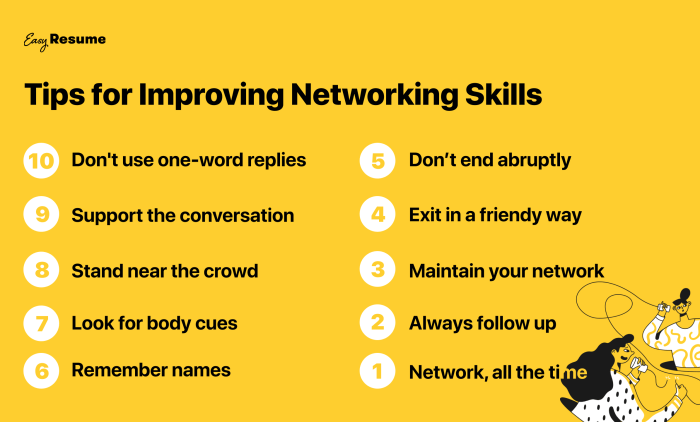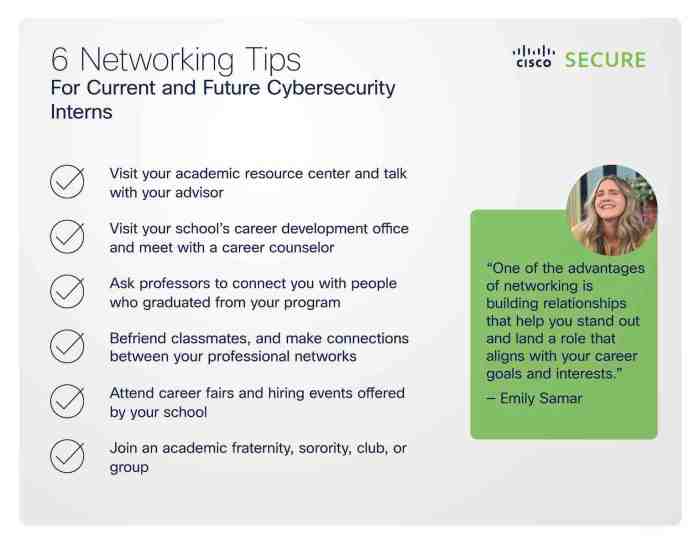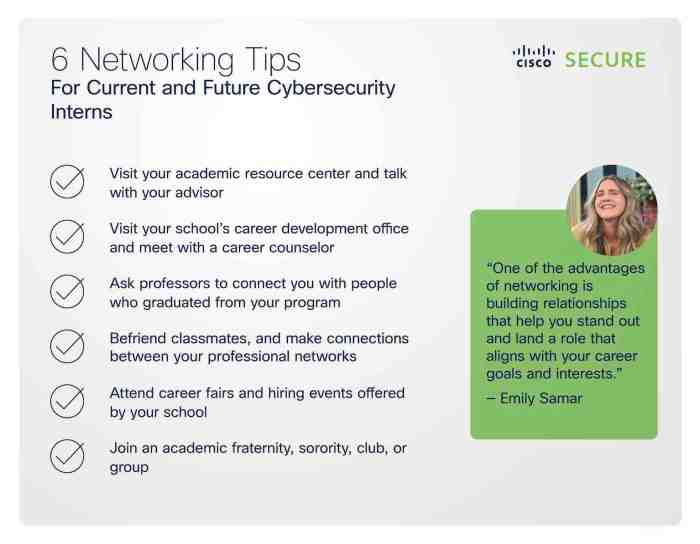Networking Tips for Professionals: Mastering the Art of Effective Networking sets the stage for a deep dive into the world of professional connections, offering valuable insights and strategies to help individuals navigate the complex landscape of networking with confidence and finesse.
Whether you’re a seasoned professional looking to expand your network or a newcomer eager to make meaningful connections, this guide is your go-to resource for unlocking the power of networking in today’s competitive business environment.
Importance of Networking in Professional Life
Networking is a vital aspect of professional life that can significantly impact one’s career trajectory. By connecting with other professionals, individuals can gain valuable insights, opportunities, and support that can help them grow and excel in their respective fields.
Advancement in Career
- Networking can open doors to new job opportunities that may not be advertised publicly. Through connections, professionals can learn about job openings and receive referrals that can give them a competitive edge in the hiring process.
- Building a strong network can also lead to mentorship opportunities, where experienced professionals can provide guidance and advice to help navigate challenges and make informed career decisions.
- Networking events, conferences, and online platforms offer professionals the chance to showcase their skills and expertise, increasing visibility and recognition within their industry.
Building Long-Lasting Relationships
- Networking is not just about making connections for immediate gain but also about nurturing long-term relationships that can provide ongoing support and collaboration opportunities.
- By investing time and effort in building relationships with peers, mentors, and industry leaders, professionals can create a strong support system that can offer advice, feedback, and referrals throughout their career.
- Networking also allows professionals to stay updated on industry trends, developments, and opportunities, enabling them to adapt and grow in a rapidly changing professional landscape.
Effective Networking Strategies

Networking is crucial for professional success in today’s competitive world. Here are some effective strategies to help you make meaningful connections and build a strong network.
Online Networking Tips
- Create a strong LinkedIn profile that highlights your skills and experiences.
- Join professional groups and actively participate in discussions to increase visibility.
- Connect with industry influencers and thought leaders to expand your network.
- Share valuable content and insights to showcase your expertise.
Offline Networking Tips
- Attend industry conferences, seminars, and networking events to meet new people.
- Come prepared with business cards and a brief elevator pitch about yourself.
- Listen actively and show genuine interest in others to build rapport.
- Follow up with new contacts within 48 hours to maintain the connection.
Creating a Memorable First Impression
- Dress professionally and maintain good posture to convey confidence.
- Smile and offer a firm handshake while making eye contact.
- Ask engaging questions and actively listen to show interest in the other person.
- Share your unique value proposition to stand out from the crowd.
Importance of Following Up
- Send a personalized thank you email after networking events to express gratitude.
- Connect with new contacts on LinkedIn and engage with their posts to stay on their radar.
- Schedule follow-up meetings or calls to deepen the relationship and explore collaboration opportunities.
- Keep in touch periodically to nurture the connection and offer support when needed.
Building a Strong Professional Network: Networking Tips For Professionals
Networking is key to success in the professional world, and building a strong network can open up countless opportunities for growth and advancement in your career. Here are some tips to help you establish and maintain a robust professional network:
Identifying and Connecting with Key Professionals, Networking Tips for Professionals
When looking to connect with key professionals in your industry, it’s essential to do your research and identify individuals who are influential and well-respected. Attend industry events, conferences, and seminars to meet these professionals in person. Utilize social media platforms like LinkedIn to reach out and connect with them virtually.
Nurturing Relationships within Your Network
Building a strong professional network is not just about making connections, but also about nurturing relationships. Stay in touch with your contacts regularly, whether through emails, phone calls, or meetings. Offer help and support whenever you can, and be genuinely interested in their work and success.
The Benefits of a Diverse Network
Having a diverse network of contacts can provide you with a wide range of perspectives, insights, and opportunities. By connecting with professionals from different backgrounds, industries, and expertise areas, you can gain valuable knowledge, expand your horizons, and access new resources that can help you succeed in your career.
Leveraging Social Media for Networking
Social media has become a powerful tool for professional networking, with platforms like LinkedIn offering a unique space to connect with industry professionals, potential employers, and colleagues. Utilizing social media effectively can significantly enhance your networking opportunities and help you advance in your career.
Using LinkedIn for Professional Networking
- Create a strong LinkedIn profile that highlights your skills, experiences, and achievements. Use a professional profile picture and include a compelling summary to attract connections.
- Regularly update your profile with relevant content, such as sharing industry news, articles, and insights. Engage with your connections by commenting on their posts and sharing valuable content.
- Join LinkedIn groups related to your field or interests to expand your network. Participate in group discussions, share your expertise, and connect with like-minded professionals.
Dos and Don’ts of Networking on Social Media
- Do: Be authentic and genuine in your interactions. Build relationships by offering help, advice, and support to your connections.
- Do: Personalize your connection requests by mentioning how you know the person or why you want to connect. Avoid sending generic requests.
- Don’t: Spam your connections with promotional content. Focus on building meaningful relationships rather than constant self-promotion.
- Don’t: Ignore messages or connection requests. Respond promptly and professionally to maintain a positive online presence.
Overcoming Networking Challenges

Networking can be challenging, especially for introverted professionals. However, with the right strategies and mindset, anyone can effectively build a strong professional network.
Networking Strategies for Introverted Professionals
- Focus on one-on-one interactions: Instead of large events, try to connect with people individually.
- Set small goals: Start with reaching out to one new person each week to gradually expand your network.
- Utilize social media: Engage in online networking to build connections in a more comfortable setting.
Handling Rejection and Lack of Response
- Don’t take it personally: Rejection is a normal part of networking, and it’s important to stay positive and keep trying.
- Follow up politely: If you don’t get a response, send a gentle reminder or try reaching out through a different channel.
- Seek feedback: Use rejection as an opportunity to learn and improve your networking approach.
Overcoming Networking Anxiety and Building Confidence
- Practice self-care: Prioritize your mental and emotional well-being to boost your confidence in networking situations.
- Prepare and research: Knowing more about the people you’ll be networking with can help alleviate anxiety and build confidence.
- Start small: Begin by networking with people you’re comfortable with before branching out to new connections.






